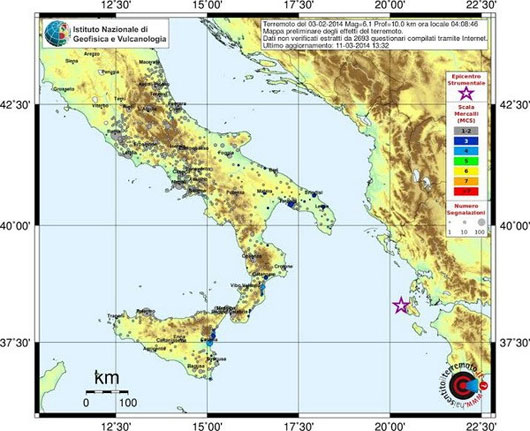The best 'place' to feel an earthquake?
Reports from Italy said here, the most obvious place to experience an earthquake is . in bed!
Earthquakes often shake Italy, the country between the two tectonic plates of Africa and Eurasia. When the Italians felt the earthquake, they could describe this phenomenon on the National Institute of Geophysics and Volcanology (Italian: Istituto Nazionale di Geofisica e Vulcanologia, or INGV) in Rome. They will answer online questions about what they feel, where they are and what they are doing when the earthquake takes place.
These questions are similar to the US Geological Survey questions on the 'Did You Feel It?' Website . . This site collects information about earthquakes around the world.
With more than 600,000 reports, the INGV database provides a valuable insight into how people receive earthquakes. According to INGV researcher Paola Sbarra, what people are doing greatly affects the perception of an earthquake, even the smallest, than where they are.
Researchers found that a person who is doing nothing, especially when waking up in bed, is more likely to feel an earthquake than someone who is working. Next is the effect of elevation: people living on high floors feel stronger vibrations than those on the lower floors.

Earthquake Virginia: a map depicting the magnitude of earthquakes in Virginia.(Photo: livescience.com)
'We are surprised that the sensation of earthquakes depends more on what we are doing than we are, ' said Sbarra, currently measuring the magnitude of the earthquake in Europe. receiving earthquakes depends more on the standing position than the activity being done.
This scale has 12 levels and describes people's experiences when an earthquake hits. For example, the number of people who feel earthquakes are at level 5 (relatively strong) is important because engineers and insurance staff will predict earthquake damage based on this rating.
This result confirms one thing: people in the same room do not feel the vibrations of a small earthquake. The person sitting on the sofa could feel the earthquake, while the person who was walking down the hallway or cooking could not feel anything.
'What you are doing will affect your ability to feel an earthquake more than where you are. The feeling of earthquakes is most obvious when you are doing nothing. People who are moving or operating are those with the least sense of earthquakes, " Sbarra said.
For example, a 2005 study published in Earthquake Spectra found that people tend to talk too much about their earthquake experience, a phenomenon called cognitive fulcrum (cognitive anchoring).
A man from Sacramento (California) once boasted: 'I survived the 1989 earthquake ,' while the earthquake caused damage in Loma Prieta and San Francisco 80 miles (130km) away. West. 'They think we can handle everything because they have survived a big earthquake ,' Wald said.
USGS has collected about 2.5 million reports via the website "Did You Feel It?" These reports clearly show that earthquakes are more pronounced on the East Coast than on the West Coast, because on the East Coast the Earth's crust is older and less prone to cracking than the West Bank, so earthquake waves are transmitted further. .
After the 2011 Virginia earthquake, the site also helped rescue workers find out where to suffer the most. 148,000 reports from the event helped the USGS know exactly where the earthquake was strongest, even if there were few earthquake meters there. Press agencies can then direct rescue workers to these locations.
- 6.1 Richter earthquake rocked Taiwan
- The earthquake rocked Taipei
- Tsunami in Japan after a strong earthquake
- Japan was again shaken by the second earthquake
- 3.3 degree earthquake in Bac Tra My
- Tokyo shakes because of the earthquake
- Nicaragua has strong earthquakes, spreading to many neighboring countries
- Princess mummy 'causes earthquakes'
- Why is the fingertip the most tactile place?
- Japan again shook because of the 6.1-magnitude earthquake
- Realizing that super-earthquake will happen, 40 million people will die
- Extremely powerful earthquake strikes Myanmar, aftershocks everywhere
 Is the magnetic North Pole shift dangerous to humanity?
Is the magnetic North Pole shift dangerous to humanity? Washington legalizes the recycling of human bodies into fertilizer
Washington legalizes the recycling of human bodies into fertilizer Lightning stone - the mysterious guest
Lightning stone - the mysterious guest Stunned by the mysterious sunset, strange appearance
Stunned by the mysterious sunset, strange appearance